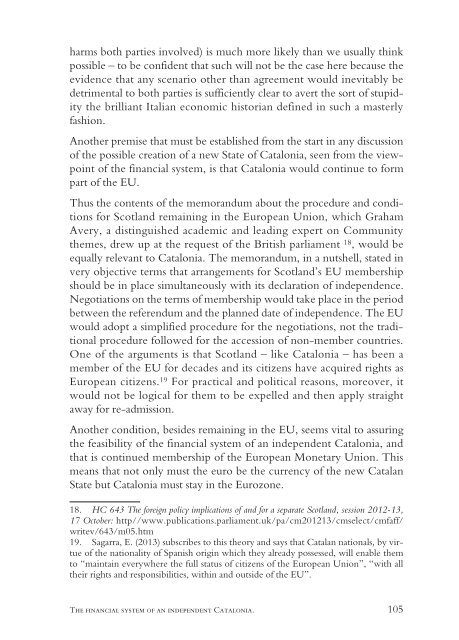The Economy of Catalonia
the_economy_of_catalonia._questions_and_answers_on_the_economic_impact_of_independence
the_economy_of_catalonia._questions_and_answers_on_the_economic_impact_of_independence
You also want an ePaper? Increase the reach of your titles
YUMPU automatically turns print PDFs into web optimized ePapers that Google loves.
harms both parties involved) is much more likely than we usually think<br />
possible – to be confident that such will not be the case here because the<br />
evidence that any scenario other than agreement would inevitably be<br />
detrimental to both parties is sufficiently clear to avert the sort <strong>of</strong> stupidity<br />
the brilliant Italian economic historian defined in such a masterly<br />
fashion.<br />
Another premise that must be established from the start in any discussion<br />
<strong>of</strong> the possible creation <strong>of</strong> a new State <strong>of</strong> <strong>Catalonia</strong>, seen from the viewpoint<br />
<strong>of</strong> the financial system, is that <strong>Catalonia</strong> would continue to form<br />
part <strong>of</strong> the EU.<br />
Thus the contents <strong>of</strong> the memorandum about the procedure and conditions<br />
for Scotland remaining in the European Union, which Graham<br />
Avery, a distinguished academic and leading expert on Community<br />
themes, drew up at the request <strong>of</strong> the British parliament 18 , would be<br />
equally relevant to <strong>Catalonia</strong>. <strong>The</strong> memorandum, in a nutshell, stated in<br />
very objective terms that arrangements for Scotland’s EU membership<br />
should be in place simultaneously with its declaration <strong>of</strong> independence.<br />
Negotiations on the terms <strong>of</strong> membership would take place in the period<br />
between the referendum and the planned date <strong>of</strong> independence. <strong>The</strong> EU<br />
would adopt a simplified procedure for the negotiations, not the traditional<br />
procedure followed for the accession <strong>of</strong> non-member countries.<br />
One <strong>of</strong> the arguments is that Scotland – like <strong>Catalonia</strong> – has been a<br />
member <strong>of</strong> the EU for decades and its citizens have acquired rights as<br />
European citizens. 19 For practical and political reasons, moreover, it<br />
would not be logical for them to be expelled and then apply straight<br />
away for re-admission.<br />
Another condition, besides remaining in the EU, seems vital to assuring<br />
the feasibility <strong>of</strong> the financial system <strong>of</strong> an independent <strong>Catalonia</strong>, and<br />
that is continued membership <strong>of</strong> the European Monetary Union. This<br />
means that not only must the euro be the currency <strong>of</strong> the new Catalan<br />
State but <strong>Catalonia</strong> must stay in the Eurozone.<br />
18. HC 643 <strong>The</strong> foreign policy implications <strong>of</strong> and for a separate Scotland, session 2012-13,<br />
17 October: http//www.publications.parliament.uk/pa/cm201213/cmselect/cmfaff/<br />
writev/643/m05.htm<br />
19. Sagarra, E. (2013) subscribes to this theory and says that Catalan nationals, by virtue<br />
<strong>of</strong> the nationality <strong>of</strong> Spanish origin which they already possessed, will enable them<br />
to “maintain everywhere the full status <strong>of</strong> citizens <strong>of</strong> the European Union”, “with all<br />
their rights and responsibilities, within and outside <strong>of</strong> the EU”.<br />
<strong>The</strong> financial system <strong>of</strong> an independent <strong>Catalonia</strong>. 105


